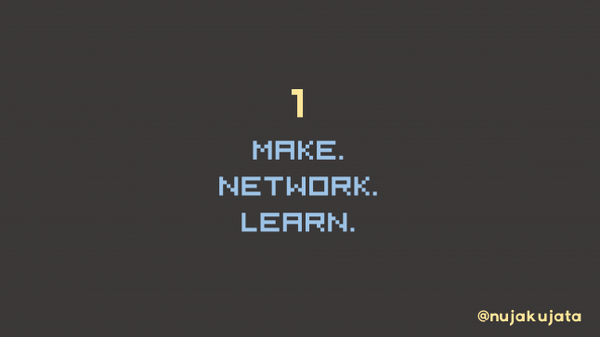
Featured Blog | This community-written post highlights the best of what the game industry has to offer. Read more like it on the Game Developer Blogs.
10 Tips for Game Dev Veterans and Students Alike
All members of the game development community share similar stories of struggle, failure, discipline and mentorship. These 10 tips are part of this collective hive mind of game making that can guide the new and revitalize the old.

Recently I helped co-found the Ann Arbor chapter for the International Game Developers Association after aiding in a monthly meetup community or two throughout Michigan. The state is an odd duck of sorts, attracting a wide array of game developers to the southern belt to be near family, start their own company or enjoy our not-so-well-known hospitable weather. I have had the pleasure of meeting many of these industry vets at a time where I was maturing as both a professional and an academic. For much of the beginning of my teaching career I was placed in administrative, director or general leadership roles. I did what I could, taking all of the feedback I could muster to improve my courses and the games I was making. I felt as though I were the blind leading the blind, but through Michigan's community boom in the last year I've discovered something vital: a general set of principles, lessons or tips that really define what we should do and how we should deal with doing them.
We all share similar stories of struggle, self-teaching, notoriety and discipline.
When we start our careers as students, hobbyists or entrepreneurs we look up to those around us to guide our path. We get lucky and find ourselves in a set of circumstances that connect us with someone great. Or, we battle with the lack of such a connection and search, hunt and barter to find that connection.
When we sit on over a decade's worth of experience we cannot help but look down to those around us to guide their path. We need them to continue to facilitate our projects, grow as businesses or replace skillsets of friends and coworkers who have moved on to new projects, industries or goals. Students and interns become a necessity to maintain growth, foster more relationships and develop connections that could make a big impact down the line.
Effectively, we are all in the same boat. Dealing with the same problems. Arriving at similar solutions.
These are 10 things that we should remember regardless of our level of experience.

1. Make. Network. Learn.
Never stop making. Never stop attending events, conferences or local meetups. Never stop taking the time to learn new things, experiment and research something different. By doing so you are expanding your skills, holding on to a profitable work ethic and demonstrating the fundamental skills necessary to keep going in the industry.
Nobody ever, ever makes it big from their first project. It may take hundreds of them for you to reach that goal you want to get to. Not being afraid to learn to get yourself to a point where you can make and contribute to a title that does reach your goal is a priority. This will never change and is not something you just have one day.

2. Have Discipline.
This constant struggle of making, learning, networking is ever present. It will not change. Hone it. Find a schedule and follow it. Do what works. Complete things. Learn from your unfinished projects, make it presentable and move on. Students need to grow up, become responsible, are often living on their own for the first time, engaging in relationships and working while attending school. This is the best time to establish your own schedule to balance these things. Veterans, you know this balance game never stops. It is always something you work on and deal with as things come up. New jobs, your partner's schedule changes, your own schedule changes, kids, a move, etc.
3. Don't Be A ...Jerk.
Everyone loves a good story about someone losing their mind and going wild. We are all in this together. You will be or have been frustrated. You want to lose it sometimes. We all do. Find a way to alleviate that. One of the best lessons I have ever learned is figuring out what stressors lead you down a path of anger, contempt or disruptive raw emotion. Look at it this way: let problems define you or allow yourself to be self-defined. Discover those methods for getting away from work and the problems related to it and tap into it. Whether you need those outlets right now or not you should engage in those activities regularly. Letting a problem get to you and taking it out on a teammate or colleague is enough to get you blacklisted immediately.

4. We are all Students.
Always. While I touched on learning already, we can't forget that others are going through these pathways too. Experience level is irrelevant in this way because we are always looking to learn something new. We see other people doing cool things and we want to do the same. We crave mentorship and mastery as they fulfill some of our basic psychology needs. We are always mastering things so this cycle just never ends.
 5. Communicate. Be Present.
5. Communicate. Be Present.
It doesn't matter what your role is, speak up, ask questions and be present. Dealing with conferences? People? Networking? If it helps, establish Agile/Scrum-like meetings at work or school. Find what works best for your team. Nothing to report? That is fine, but keep things going and make sure meetups are regularly advertised. People will be there. People will be present if they know it is happening with or without them. You will be surprised at how easy it is to talk to someone who worked on your favorite game. You will be just as surprised to find a ton of potential in someone looking to get into the industry who happens to love a project you contributed to.
If you're looking to establish a certain culture within your studio or community: keep it consistent.
Pro tip: shyness can be counteracted by asking people about themselves.

6. Do Not Be A Hater.
It is easy to dismiss games you don't like. There is value in everything, though. Games, movies, books and disciplines new and old offer a ton of insight, inspiration and influence that could lead to amazing revelations. Try not to bother with why something is terrible. Focus on what made it that way on a critical level from an objective standpoint and apply that to your own methodology and workflow.

7. It Is Not About You.
Check the ego. Nobody owes you a thing. See opportunities, gossip and drama from this perspective. Pass on the amazing idea you had that nobody liked. Allow someone to do things their way even if you tried convincing them otherwise. Trust in your team and foster these moments, don't trash talk them.
In the college courses I teach I'll direct as much as I can, but I often say "prove me wrong" or "justify and validate" if a student wants to go a different route. We both grow from it. A conversation is had and we discover new things or validate what we already felt we knew.

8. Handle It.
Take feedback. Do not whine or complain. Whatever the task is at hand, make it happen. All of these tips have everything to do with making, learning, networking, dealing with the routine and being well adjusted. If you need to vent about a problem or a bad day or something someone said, figure out how to go about doing that and choose to exercise venting appropriately.

9. Trust and Teach.
Some of the best managers, directors and all-around developers I know look at leadership roles as teaching experiences. They are there to take whatever their team can do and elevate it. Do not force people to replicate one artist's style. Let them have their own take based on their own skills and elevate that to fit the mold. If you're a lead, heed this. If you're on a team, encourage this approach. Exercise this.

10. Know When To Quit.
My grandfather always told me a "good artist knows when to stop". I follow that line of thought. It won't be easy at first without experience to spot these situations, but it can be just as difficult for a vet to find themselves in a bad spot. A bad team, a bad gig, a risky opportunity. Avoid working with people with bad reputations. Know a bad reputation from a "bad reputation". Ask for advice and do not be afraid to take risks.
Read more about:
Featured BlogsAbout the Author(s)
You May Also Like









